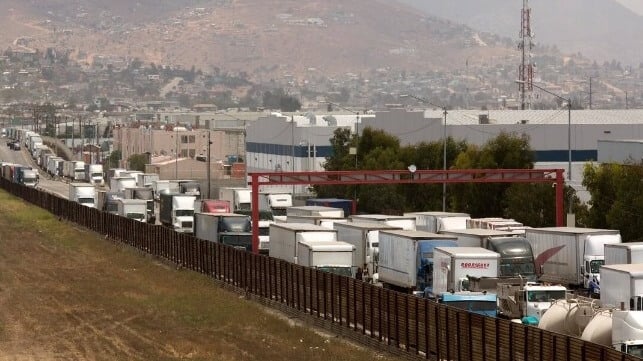Trump Delays Tariff Hikes For Canada and Mexico, But Not China

After receiving border-control concessions from Mexico and Canada, U.S. President Donald Trump has delayed his plan to impose 25 percent tariffs on both nations' exports by another 30 days, heading off the economic effects of a price hike on goods and components from two of America's top trading partners.
Stocks took a steep dive Monday morning on expectations that the tariffs would take hold, then returned to normal trading patterns after the announcement. The NASDAQ shed two percent of its value in early trading, but after news broke of a deal with Mexico to postpone the tariff, the index recovered a percentage point. The Dow recovered almost all of its value by the closing bell.
In a statement Monday morning, Mexican President Claudia Sheinbaum said that she would send 10,000 national guard troops to the U.S.-Mexico border in an attempt to slow down the flow of fentanyl and other drugs into the United States. American fentanyl dealers obtain most of their supply from Mexican producers, and the potent drug is comparatively easy to smuggle across the land border. The narcotic is dangerous even in minute doses: it caused about 60,000 overdose deaths in 2023-4.
In return, Sheinbaum obtained a commitment from Trump to help control trafficking of high-powered rifles into Mexico. Semiautomatic weapons are tightly regulated within Mexico, so cartels obtain firepower at gun shops on the U.S. side of the border - typically through straw buyers - and then smuggle the weapons south. About 250,000-1,000,000 guns are trafficked illegally into Mexico every year, according to U.S. intelligence, along with ammunition and tactical gear.
Canadian Prime Minister Justin Trudeau spoke with Trump twice over the course of the day on Monday, and reached a similar agreement to suspend U.S. tariffs for a month. The deal will see Canada spend about $1 billion on upgrading its border controls with "new choppers, technology and personnel," Trudeau said.

that matters most
Get the latest maritime news delivered to your inbox daily.
The White House's previously-announced 10 percent tariff on Chinese goods is still set to go into effect. So far, China's leaders have made few objections, besides promising to bring a lawsuit at the World Trade Organization - a procedural step without immediate effects.
"Though the port industry supports President Trump’s efforts to combat the flow of illicit drugs, tariffs will slow down our supply chains, tax American businesses and increase costs for hard-working citizens," said Cary S. Davis, AAPA President and CEO. "Instead, we call on the Administration and Congress to thoughtfully pursue alternatives to achieving these policy goals and exempt items critical to national security from tariffs."
